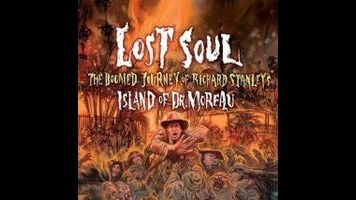Lost Soul swaps war stories from 1996’s troubled flop The Island Of Dr. Moreau

Stories of behind-the-scenes drama are only as entertaining as the personalities involved, and by that standard, Richard Stanley has a doozy of a story. Lost Soul: The Doomed Journey Of Richard Stanley’s Island Of Dr. Moreau is an insider’s account of the famously troubled production of The Island Of Dr. Moreau, the 1996 box-office misfire. That film, starring David Thewlis, Marlon Brando, and Val Kilmer, is a deeply weird mess, and why it all fell apart is a grand and multi-faceted story, almost on par with Lost In La Mancha, the high-water mark for “failed film” documentaries.
Lost Soul revolves around how Stanley—the indie horror auteur behind the excellent Hardware and Dust Devil—lost his passion project, a story he had dreamed of telling since he was a child. Stanley was kicked off the film he had spent years developing, writing, and putting together, only to watch as the entire project fell into disarray after his dismissal. It’s amazing that a reasonably coherent movie came out of the whole disaster. If nothing else, replacement director John Frankenheimer should be congratulated for finishing the job, even if he also shoulders a fair chunk of the blame.
The documentary’s biggest problem is that it’s oriented around Stanley, and he’s not the most interesting aspect of the story. He comes across as a talented artist and nice guy, with eccentricities that make for a compelling subject (he hired a witch doctor to help him land the directing job), but the tale of his disgrace and firing just can’t measure up to the colossally disastrous production that took place after he was let go. As actress Fairuza Balk puts it, “What happened to Richard was just the beginning of the nightmare.” Which is a simple way of pointing out that it’s not until halfway through the film that we get to the good stuff.
The juiciest events all occur subsequent to his leaving the film, and Lost Soul ends up splitting the difference between Stanley’s fate and the movie’s. The filmmaker’s sound bite-ready quips about how star Val Kilmer immediately began undermining his authority and hurting the film are good, but stories about Kilmer’s appalling later behavior and clash of egos with the legendary (and legendarily bizarre) Marlon Brando are better. Stanley recounting his paranoia during pre-production, intercut with talking-head execs dishing about how the oddball director lacked the force of personality necessary to corral a film of this size, just can’t compare to juicy anecdotes about Brando trying to convince Frankenheimer to turn a violent man-animal assault scene into a bar mitzvah-style celebration.
Director David Gregory has a long history of behind-the-scenes documentary shorts, and the film feels like a 90-minute making-of doc that would accompany The Island Of Dr. Moreau as a DVD bonus. His talking heads often have charisma—especially the Australian cast and crew who are only too happy to deliver brutally honest assessments of everyone involved—but there’s not much to distinguish the film from a good magazine article, at least in terms of content. Narratively, it makes a strong case that, had Stanley been allowed to make the film he wanted, it might’ve ended up great, rather than the bizarre spectacle we’re left with. But it also lets the studio people who made the decision to remove Stanley have their say, explaining why the director’s erratic attitude led them to act as they did.
Balk is the only one of the film’s stars who agreed to take part in this documentary, and it’s no surprise that her stories and views are some of the most informative. She has one of the film’s best moments, describing how her efforts to talk to Brando about their characters instead resulted in his happily confessing he didn’t give a shit. Her insights lead the viewer to wish the film’s lead actor, David Thewlis, had participated as well. (Kilmer comes off looking the worst, so it’s not shocking he wanted no part of this.) The film is at its best when cutting between delicious stories: of bawdy all-night parties, Frankenheimer’s predilection for scream-first-direct-later strategies, and Kilmer generally pissing off everyone in his vicinity. It doesn’t make for the strongest film, but it does work like a case of people swapping outrageous war stories over a few beers.